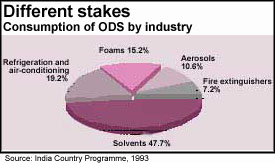The road ahead
The road ahead

the Montreal Protocol is now hailed as an "extraordinary environmental success'and has come to be regarded as a "model-setting, green, global agreement'. A recent study commissioned by Environment Canada which was tabled at mop -9 concludes that the health and financial benefits of the protocol far outweigh its costs. It estimates that the economic benefits of the agreement, signed by 163 countries, would amount to us $330 billion by 2060.
The recent reports of the Expert Assessment Panels indicate that it has gone some way in effectively curtailing ozone depletion. Just prior to the 1987 agreement, industries in 50 countries around the world were pumping out 984,327 odp -weighted mt (odp is the ozone depleting potential of a substance compared to the potential of a similar mass of cfc-11) of substances. In 10 years, this production has been reduced by over 71 per cent (283,136 odp -weighted mt). Consumption in the same period dropped by about 75 per cent from 1,159,070 odp -weighted mt in 1986 to 282,090 odp -weighted mt in 1995.
The 1990 amendments to the protocol established the Multilateral Fund to assist developing countries in reducing and ultimately eliminating use of ods . This was pivotal in securing ratification by the developing nations. Since its establishment, the Multilateral Fund has allocated us $570 million for projects in over 100 countries. China is the largest recipient, and India the second largest







